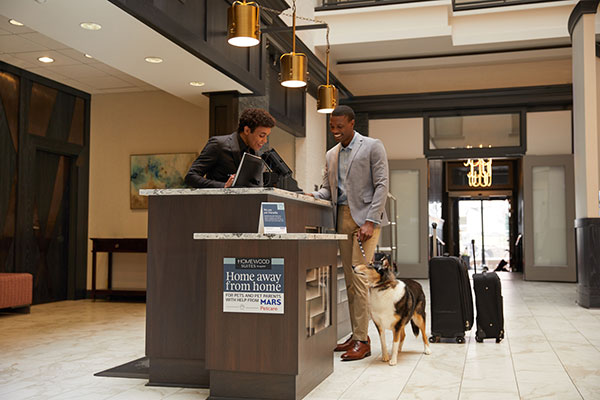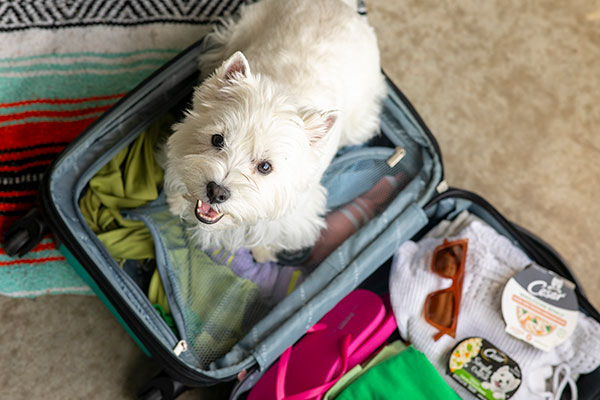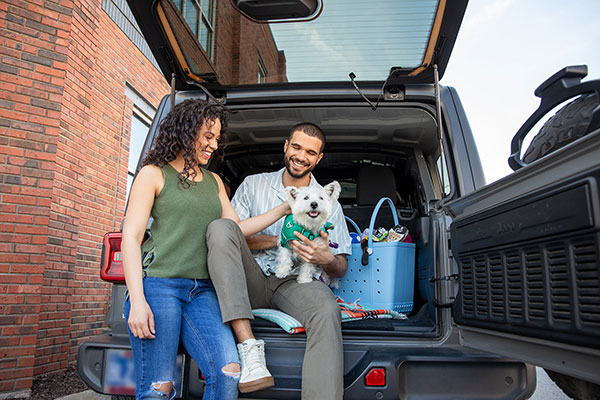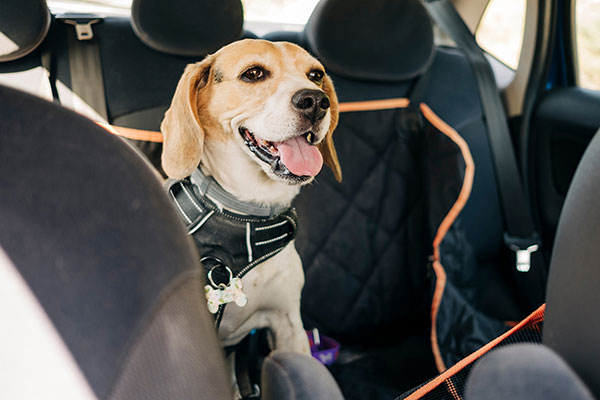Family
6 Tips for Traveling with Your Furry Friend
Last Updated on September 30, 2025 by Daily News Staff
(Family Features) No matter the distance or destination, a vacation can make for a perfect opportunity for families – including four-legged family members – to bond and spend some quality time together.
In fact, nearly three-quarters (72%) of dog owners feel traveling with their pet makes the trip more enjoyable, according to research1 by Hilton, and 56% plan to travel with their pet in the next 3-9 months. Because traveling with your furry friend requires additional planning to ensure it’s a safe, comfortable experience for everyone, consider these tips from the experts at Mars Petcare and find more information to make your trip inclusive for your pets at BetterCitiesforPets.com.

Photo courtesy of Adobe Stock
Check In with Your Veterinarian
Prior to your trip – within 10 days if traveling by plane and the airline requires a health certificate – visit your vet to ensure all vaccinations are up-to-date and that your pet doesn’t have any underlying issues or conditions that could be worsened by dealing with the stress (or heat) of traveling. Also ask for ideas to relax your furry friend in the event he or she becomes afraid, anxious or uncomfortable while in the car or on the plane.

Photo courtesy of Adobe Stock
Ensure Proper Identification
Regardless of where you’re going or how you’re getting there, it’s important to make sure your pet can be properly identified. Ensure microchip data is current and that he or she is wearing a secure collar with your name and updated contact info. Also label your pet’s carrier in case you become separated.

Photo courtesy of Mars Petcare
Look for Pet-Friendly Accommodations
According to the same survey1, 79% of pet parents’ destination choices are influenced by their pets, so it’s important to research locations that offer pet-friendly lodging options. For example, to meet pet parents’ evolving needs when traveling, Mars Petcare joined forces with Hilton to provide pet-friendly resources at its approximately 5,000 hotels across the U.S. and Canada, including access to Mars PET On-Demand and a dedicated Hilton team sharing local pet-friendly resources.

Photo courtesy of CESAR Canine Cuisine
Prep a Travel Kit
Remember you’re not the only one who will need some essentials while away from home and pack a bag for your four-legged friend that includes food, portable bowls, medications, a leash, grooming supplies and a pet-friendly first-aid kit. It may also be a good idea to pack a favorite toy to provide a sense of comfort.

Photo courtesy of CESAR Canine Cuisine
Creating Meaningful Memories
As a pet owner, you want to provide the best care possible so your dog can travel comfortably. To celebrate traveling with four-legged friends, Mars Petcare and Hilton teamed up to provide free CESAR® Canine Cuisine (while supplies last) for all dogs staying at participating pet-friendly Hilton hotels in the U.S. and in select Toronto area hotels on International Dog Day – a holiday created by pet lifestyle expert Colleen Paige. By offering free CESAR Canine Cuisine on Saturday, Aug. 26, dog lovers and their pups can enjoy their travel experience together even more. Providing pets with meals and complements they love shows them the love they deserve, which can help make the most of spontaneous adventures.

Photo courtesy of Adobe Stock
Secure Your Pet During Travel
Whether traveling by car, boat, plane or train, the safest way to take your pet along is in a secure and well-ventilated crate or carrier that is large enough for him or her to stand, sit, lay down and turn around inside. Secure the carrier so it will not slide or shift in case of abrupt stops or turns. If you opt to forgo the carrier while driving, keep your pet harnessed in the back seat and ensure heads and paws remain inside the vehicle.
1Hilton partnered with Morning Consult to inform the Pet-Friendly Survey study. Morning Consult conducted an online survey among a sample of n=2,200 adults, n=1,445 of the adult sample self-identified as owning a pet, and n=1,029 of the self-identified pet owners self-identified as owning a dog and n=773 self-identified as owning a cat. The survey was conducted in May 2023.
SOURCE:
Mars Petcare
Discover more from Daily News
Subscribe to get the latest posts sent to your email.
Family
Empowering Seniors for Safer Online Experiences: 6 Practical Safety Tips for Caregivers and Families
Safety Tips for Caregivers: Empower seniors with essential online safety tips. Learn 6 practical strategies caregivers can use to help older adults navigate digital threats, scams, and security risks confidently.
Last Updated on February 14, 2026 by Daily News Staff

Empowering Seniors for Safer Online Experiences: 6 Practical Safety Tips for Caregivers and Families
(Family Features) Today’s seniors aren’t shying away from a world that has become increasingly reliant on technology. Quite the opposite, in fact, as recent survey findings suggest adults ages 65 and older are more digitally active and self-assured than ever before. Nearly all seniors surveyed as part of the “Connecting the Digital Dots: Online Habits and Safety Concerns Across Three Generations” survey from Cox Mobile consider themselves digitally literate, using devices for shopping, banking, social media and entertainment. With older adults spending a significant amount of time connected to the digital world – 41% of those surveyed reported spending five or more hours online daily – they’re also more at-risk for scams, viruses like malware and data breaches. Even though 61% of seniors who encountered digital threats were able to mitigate the issues themselves, showing their growing digital capability, increased online engagement brings new challenges and responsibilities for caregivers, who often play a crucial role in supporting seniors’ digital journeys. To help support older loved ones’ safety and confidence as they navigate an evolving digital landscape, Cox Mobile, in partnership with Common Sense Media, offers educational materials on digital safety, smart device use and media literacy for all ages. In addition, these practical safety strategies can help empower seniors to make informed, safe choices online. Encourage Strong Passwords: Simple passwords, like number sequences, keyboard patterns or personal information – such as variations of your name, birthdate, address or names of pets or loved ones – are easily guessable and may lead to issues. While the survey found 70% of seniors already create strong, unique passwords, encourage them to avoid reusing passwords across sites. Recommend a password manager app to safely store passwords and eliminate the need to write them all down, which could lead to a breach if not stored properly. Promote Security Software: If devices aren’t protected, even the most careful users are susceptible to viruses. Though 63% of those surveyed have security software installed, it’s important to regularly make sure it’s up to date (or that automatic updates are enabled) and covers all devices, including laptops, tablets and smartphones. Enable Multi-Factor Authentication: A simple and effective way to stop most attempts at unauthorized account access, 60% of seniors are already using multi-factor authentication as an extra layer of protection. Some seniors, however, may need assistance setting up the safeguard, which typically sends a code to a phone number or email address as part of the login process, for online banking, email or social media accounts. Review Apps and Channels: Over time, it can be easy to accumulate apps on smartphones and tablets. While 51% of surveyed seniors remove unsafe apps, make it a habit to regularly check loved ones’ devices for unfamiliar or suspicious applications and delete them. Also keep an eye out for unauthorized charges, data sharing or browser extensions. Utilize Built-In Safety Features: Explore privacy controls on individual devices (and apps) and check with your loved ones’ internet service provider to ensure security features are being utilized like the 43% of those surveyed who are already taking advantage of their devices’ safety settings. Included privacy protections may include limiting data sharing, disabling location tracking, blocking pop-ups and restricting other unwanted communication. Discuss Online Safety Regularly: Because technology is ever-changing, it’s important for caregivers to talk with senior loved ones about online safety. Open, ongoing conversations, like those one-third of seniors are already having several times a week or even daily, can help build trust and awareness of current scams, suspicious texts or emails, commonly used apps and more. By fostering open dialogue, sharing practical safety strategies and leveraging trusted resources, caregivers can help their loved ones thrive and stay safe. Visit your local Cox Mobile store or go to CoxMobileSafety.com to find more tips, guides and full survey results.
Promote Security Software: If devices aren’t protected, even the most careful users are susceptible to viruses. Though 63% of those surveyed have security software installed, it’s important to regularly make sure it’s up to date (or that automatic updates are enabled) and covers all devices, including laptops, tablets and smartphones. Enable Multi-Factor Authentication: A simple and effective way to stop most attempts at unauthorized account access, 60% of seniors are already using multi-factor authentication as an extra layer of protection. Some seniors, however, may need assistance setting up the safeguard, which typically sends a code to a phone number or email address as part of the login process, for online banking, email or social media accounts. Review Apps and Channels: Over time, it can be easy to accumulate apps on smartphones and tablets. While 51% of surveyed seniors remove unsafe apps, make it a habit to regularly check loved ones’ devices for unfamiliar or suspicious applications and delete them. Also keep an eye out for unauthorized charges, data sharing or browser extensions. Utilize Built-In Safety Features: Explore privacy controls on individual devices (and apps) and check with your loved ones’ internet service provider to ensure security features are being utilized like the 43% of those surveyed who are already taking advantage of their devices’ safety settings. Included privacy protections may include limiting data sharing, disabling location tracking, blocking pop-ups and restricting other unwanted communication. Discuss Online Safety Regularly: Because technology is ever-changing, it’s important for caregivers to talk with senior loved ones about online safety. Open, ongoing conversations, like those one-third of seniors are already having several times a week or even daily, can help build trust and awareness of current scams, suspicious texts or emails, commonly used apps and more. By fostering open dialogue, sharing practical safety strategies and leveraging trusted resources, caregivers can help their loved ones thrive and stay safe. Visit your local Cox Mobile store or go to CoxMobileSafety.com to find more tips, guides and full survey results. Discover more from Daily News
Subscribe to get the latest posts sent to your email.
child education
Special Education Is Turning to AI to Fill Staffing Gaps—But Privacy and Bias Risks Remain
With special education staffing shortages worsening, schools are using AI to draft IEPs, support training, and assist assessments. Experts warn the benefits come with major risks—privacy, bias, and trust.
Seth King, University of Iowa
In special education in the U.S., funding is scarce and personnel shortages are pervasive, leaving many school districts struggling to hire qualified and willing practitioners.
Amid these long-standing challenges, there is rising interest in using artificial intelligence tools to help close some of the gaps that districts currently face and lower labor costs.
Over 7 million children receive federally funded entitlements under the Individuals with Disabilities Education Act, which guarantees students access to instruction tailored to their unique physical and psychological needs, as well as legal processes that allow families to negotiate support. Special education involves a range of professionals, including rehabilitation specialists, speech-language pathologists and classroom teaching assistants. But these specialists are in short supply, despite the proven need for their services.
As an associate professor in special education who works with AI, I see its potential and its pitfalls. While AI systems may be able to reduce administrative burdens, deliver expert guidance and help overwhelmed professionals manage their caseloads, they can also present ethical challenges – ranging from machine bias to broader issues of trust in automated systems. They also risk amplifying existing problems with how special ed services are delivered.
Yet some in the field are opting to test out AI tools, rather than waiting for a perfect solution.
A faster IEP, but how individualized?
AI is already shaping special education planning, personnel preparation and assessment.
One example is the individualized education program, or IEP, the primary instrument for guiding which services a child receives. An IEP draws on a range of assessments and other data to describe a child’s strengths, determine their needs and set measurable goals. Every part of this process depends on trained professionals.
But persistent workforce shortages mean districts often struggle to complete assessments, update plans and integrate input from parents. Most districts develop IEPs using software that requires practitioners to choose from a generalized set of rote responses or options, leading to a level of standardization that can fail to meet a child’s true individual needs.
Preliminary research has shown that large language models such as ChatGPT can be adept at generating key special education documents such as IEPs by drawing on multiple data sources, including information from students and families. Chatbots that can quickly craft IEPs could potentially help special education practitioners better meet the needs of individual children and their families. Some professional organizations in special education have even encouraged educators to use AI for documents such as lesson plans.
Training and diagnosing disabilities
There is also potential for AI systems to help support professional training and development. My own work on personnel development combines several AI applications with virtual reality to enable practitioners to rehearse instructional routines before working directly with children. Here, AI can function as a practical extension of existing training models, offering repeated practice and structured support in ways that are difficult to sustain with limited personnel.
Some districts have begun using AI for assessments, which can involve a range of academic, cognitive and medical evaluations. AI applications that pair automatic speech recognition and language processing are now being employed in computer-mediated oral reading assessments to score tests of student reading ability.
Practitioners often struggle to make sense of the volume of data that schools collect. AI-driven machine learning tools also can help here, by identifying patterns that may not be immediately visible to educators for evaluation or instructional decision-making. Such support may be especially useful in diagnosing disabilities such as autism or learning disabilities, where masking, variable presentation and incomplete histories can make interpretation difficult. My ongoing research shows that current AI can make predictions based on data likely to be available in some districts.
Privacy and trust concerns
There are serious ethical – and practical – questions about these AI-supported interventions, ranging from risks to students’ privacy to machine bias and deeper issues tied to family trust. Some hinge on the question of whether or not AI systems can deliver services that truly comply with existing law.
The Individuals with Disabilities Education Act requires nondiscriminatory methods of evaluating disabilities to avoid inappropriately identifying students for services or neglecting to serve those who qualify. And the Family Educational Rights and Privacy Act explicitly protects students’ data privacy and the rights of parents to access and hold their children’s data.
What happens if an AI system uses biased data or methods to generate a recommendation for a child? What if a child’s data is misused or leaked by an AI system? Using AI systems to perform some of the functions described above puts families in a position where they are expected to put their faith not only in their school district and its special education personnel, but also in commercial AI systems, the inner workings of which are largely inscrutable.
These ethical qualms are hardly unique to special ed; many have been raised in other fields and addressed by early-adopters. For example, while automatic speech recognition, or ASR, systems have struggled to accurately assess accented English, many vendors now train their systems to accommodate specific ethnic and regional accents.
But ongoing research work suggests that some ASR systems are limited in their capacity to accommodate speech differences associated with disabilities, account for classroom noise, and distinguish between different voices. While these issues may be addressed through technical improvement in the future, they are consequential at present.
Embedded bias
At first glance, machine learning models might appear to improve on traditional clinical decision-making. Yet AI models must be trained on existing data, meaning their decisions may continue to reflect long-standing biases in how disabilities have been identified.
Indeed, research has shown that AI systems are routinely hobbled by biases within both training data and system design. AI models can also introduce new biases, either by missing subtle information revealed during in-person evaluations or by overrepresenting characteristics of groups included in the training data.
Such concerns, defenders might argue, are addressed by safeguards already embedded in federal law. Families have considerable latitude in what they agree to, and can opt for alternatives, provided they are aware they can direct the IEP process.
By a similar token, using AI tools to build IEPs or lessons may seem like an obvious improvement over underdeveloped or perfunctory plans. Yet true individualization would require feeding protected data into large language models, which could violate privacy regulations. And while AI applications can readily produce better-looking IEPs and other paperwork, this does not necessarily result in improved services.
Filling the gap
Indeed, it is not yet clear whether AI provides a standard of care equivalent to the high-quality, conventional treatment to which children with disabilities are entitled under federal law.
The Supreme Court in 2017 rejected the notion that the Individuals with Disabilities Education Act merely entitles students to trivial, “de minimis” progress, which weakens one of the primary rationales for pursuing AI – that it can meet a minimum standard of care and practice. And since AI really has not been empirically evaluated at scale, it has not been proved that it adequately meets the low bar of simply improving beyond the flawed status quo.
But this does not change the reality of limited resources. For better or worse, AI is already being used to fill the gap between what the law requires and what the system actually provides.
Seth King, Associate Profess of Special Education, University of Iowa
This article is republished from The Conversation under a Creative Commons license. Read the original article.
Discover more from Daily News
Subscribe to get the latest posts sent to your email.
Lifestyle
A Legacy of Service: How family stories shape service
Legacy of Service: Discover how military service creates lasting family legacies across generations. Explore powerful veteran stories from the Veterans History Project, including Pearl Harbor survivors and Code Talkers, and learn how to preserve your family’s service history.
Last Updated on February 6, 2026 by Daily News Staff

A Legacy of Service: How family stories shape service
(Family Features) Major historical events like war or military service make a lasting impact on family identity, values and traditions, often reverberating across multiple generations. Veterans frequently speak about their military units as if they were family, given the unbreakable bonds that develop between comrades. However, for some veterans, “brothers in arms” is more than a figurative turn of phrase. Throughout the 20th century, entire families felt the firsthand effects of war, with multiple generations serving. Brothers enlisted together. A father’s military legacy inspired his children to join up. Sweethearts met and married while in uniform. These stories not only illustrate the experiences of individual veterans but also provide an intimate glimpse into family legacies of military service. Consider the Veterans History Project, a program overseen by the Library of Congress, which collects and preserves the firsthand remembrances of U.S. military veterans and makes them accessible for future generations to better understand veterans’ service and sacrifice. These personal stories encompass original correspondence, memoirs, diaries, photographs and oral history interviews, all offering deeper insight into the long-term impact of military service. Veterans’ narratives are collected by volunteers, and anyone who served from World War I to today can submit their personal story, regardless of whether or not they saw combat. The collections frequently shed light on the importance of family in military experiences. Whether expressed through heartfelt letters home, enduring family legacies of service or the experience of serving alongside loved ones, these stories reflect profound connections. Family Identity During the Cold War, Jennifer McNeill rose from Army Dental Assistant to Command Sergeant Major at the Army Eisenhower Medical Center in Fort Gordon, Georgia. Her collection includes a poignant photograph of her mother sharing images of her four military daughters in uniform, underscoring how family identity and military service are closely connected. Values Military service makes a lasting impression on veterans, shaping the experiences and the values that guide them through life. Ray Chavez is one such example. He was the oldest known Pearl Harbor survivor before his passing in 2018. For most of his life, he remained silent about his experiences, but in 1991, his daughter, Kathleen Chavez, who served in the U.S. Navy during Desert Storm, convinced him to return to Pearl Harbor. That trip marked the first time he spoke openly about his service. Kathleen shared their family’s deep military legacy in her oral history for the Veterans History Project. Traditions Across Generations Serving in the military is a deeply personal journey, but for many veterans, it’s an experience that transcends generations. Bill Toledo enlisted in the Marine Corps in October 1942 at the age of 18. Along with his uncle, Frank Toledo, and cousin, Preston Toledo, he served as a Code Talker transmitting military messages through secret codes. In his oral history, Bill vividly recalled both the challenges of combat during the invasion of Iwo Jima in February 1945, and the treasured moments spent with his uncle. These and many other family stories of military service and remembrance are available to the public at loc.gov/vets. Photo courtesy of Shutterstock (men looking at scrapbook)
Photo courtesy of the Library of Congress (man and woman on park bench)
Family Identity During the Cold War, Jennifer McNeill rose from Army Dental Assistant to Command Sergeant Major at the Army Eisenhower Medical Center in Fort Gordon, Georgia. Her collection includes a poignant photograph of her mother sharing images of her four military daughters in uniform, underscoring how family identity and military service are closely connected. Values Military service makes a lasting impression on veterans, shaping the experiences and the values that guide them through life. Ray Chavez is one such example. He was the oldest known Pearl Harbor survivor before his passing in 2018. For most of his life, he remained silent about his experiences, but in 1991, his daughter, Kathleen Chavez, who served in the U.S. Navy during Desert Storm, convinced him to return to Pearl Harbor. That trip marked the first time he spoke openly about his service. Kathleen shared their family’s deep military legacy in her oral history for the Veterans History Project. Traditions Across Generations Serving in the military is a deeply personal journey, but for many veterans, it’s an experience that transcends generations. Bill Toledo enlisted in the Marine Corps in October 1942 at the age of 18. Along with his uncle, Frank Toledo, and cousin, Preston Toledo, he served as a Code Talker transmitting military messages through secret codes. In his oral history, Bill vividly recalled both the challenges of combat during the invasion of Iwo Jima in February 1945, and the treasured moments spent with his uncle. These and many other family stories of military service and remembrance are available to the public at loc.gov/vets. Photo courtesy of Shutterstock (men looking at scrapbook)
Photo courtesy of the Library of Congress (man and woman on park bench) Discover more from Daily News
Subscribe to get the latest posts sent to your email.
